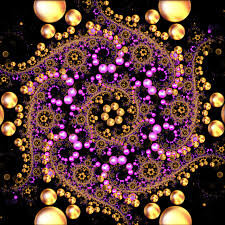smcder
Paranormal Adept
"These monads represent Leibniz's answer to the microsubjects postulated by constitutive panpsychism, but are a far more carefully considered concept. Leibniz sees that we cannot simply specify “experience” along with the physical properties of a particle or of whatever other basic component of reality we choose.
He recognizes that the fundamental property of experience is perspective, or a point-of-view on reality, and that this perspective generates the monad's specific representation of what it sees as an objective material universe, but is actually the expression of its relation to all the other monads 43 .
This has similarities to Russell's observation that physics expresses relational dispositions rather than intrinsic properties."
The author also notes Leibnitz's "fractal" view of the world.
Indra's net - Wikipedia

He recognizes that the fundamental property of experience is perspective, or a point-of-view on reality, and that this perspective generates the monad's specific representation of what it sees as an objective material universe, but is actually the expression of its relation to all the other monads 43 .
This has similarities to Russell's observation that physics expresses relational dispositions rather than intrinsic properties."
The author also notes Leibnitz's "fractal" view of the world.
Indra's net - Wikipedia





